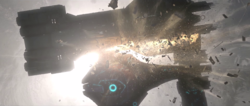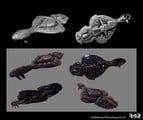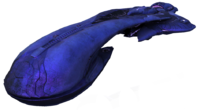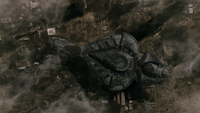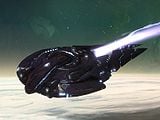Nanolaminate
From Halopedia, the Halo wiki

Nanolaminate is a type of material used as battle plating for Covenant warships[1] and Sangheili combat harnesses.[2][3] Possessing a characteristic opalescent-like shine,[4] nanolaminate can range in color from purplish to white-blue or silver, while Kig-Yar vessels are generally bluish-black in color.[5] The plating is very strong and heat resistant, with the support of energy shielding allowing Covenant ships to take more damage.[6] The amount of nanolaminate plating applied to each ship depends on the class, though Ruma-pattern light carriers have well over thirty meters of armor plating.[7] As of 2525, nanolaminate plating has not seen use in any human construction.[8]
Characteristics
Defensive capabilities
Nanolaminate hull plating allows ships to be resilient to most UNSC weaponry. UNSC point-defense guns are not powerful enough to do significant damage to the plating,[9] Archer missiles prove to be very effective against the unshielded hull of a Covenant vessel, causing the ship to become very vulnerable following the resulting explosions of the missiles.[10] Magnetic Accelerator Cannons are often used to disable and destroy Covenant vessels after the energy shielding fails, being powerful enough to pierce the nanolaminate hull plating of most ships with a single round.[11] A single pack of C-12 shaped charges can easily puncture a large hole through the hull of a Covenant cruiser.[12] Some Covenant cruisers are capable of taking a direct hit from a mass driver at near point-blank range with only minor structural damage done to the nanolaminate plating, but a second hit in the same spot will puncture the vessel.[13]
However, Covenant weaponry is more effective against nanolaminate plating. The carrier Ascendant Justice, one of the most powerful vessels in the Covenant fleet, was heavily damaged by a single plasma torpedo, with several layers of the armor plating boiling away.[14]
The Sangheili continued to improve their ships' nanolaminate plating and other onboard technologies in the wake of the Human-Covenant War. Following a joint anti-piracy operation with the UNSC Navy in a Joint Occupation Zone in 2557, ONI analysis noted improvements to the hull plating of the assault carrier Shadow of Intent.[1]
Heat resilience
The nanolaminate plating is very heat resistant, allowing Covenant vessels to enter extreme atmospheres or absorb the long-range damage from human nuclear weapons. Upon entering the gas giant Threshold's atmosphere shield-less, the hull of Ascendant Justice heated to three hundred degrees Celsius, with no actual structural damage done to the ship.[6] Only when the ship reached temperatures of over seventeen hundred degrees Celsius did minor hull tearing and conduit melting occur.[15] However, at such high temperatures, the superstructure of the vessel becomes considerably softened.[16]
Trivia
The shield used by the Covenant's Mgalekgolo soldiers is made up of starship-grade nanolaminate alloy.[17]
Gallery
Covenant space fighters, like the Seraph, are armored with nanolaminate plating.
Sources
- ^ a b Halo Waypoint: Catalog Interaction - Page 14
- ^ Halo Waypoint - Community Update (07/29/16): The Finals Countdown
- ^ Halo Waypoint, The New Halo Encyclopedia is Out Today (Retrieved on Mar 11, 2023) [archive]
- ^ Halo: The Fall of Reach, page 119
- ^ Halo: Contact Harvest, page 26
- ^ a b Halo: First Strike, page 79
- ^ Halo: First Strike, page 266
- ^ Halo: Contact Harvest, page 176
- ^ Halo: The Fall of Reach, page 272
- ^ Halo: The Fall of Reach, page 179
- ^ Halo: The Fall of Reach, page 297
- ^ Halo: Evolutions - Essential Tales of the Halo Universe, "Blunt Instruments", page 202
- ^ Halo: Contact Harvest, page 342
- ^ Halo: First Strike, page 76
- ^ Halo: First Strike, page 84
- ^ Halo: First Strike, page 223
- ^ Halo Waypoint: Lekgolo
